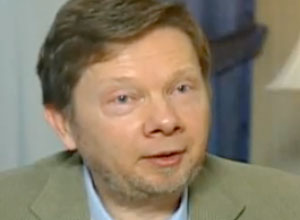|

an excerpt from Eckhart Tolle's "Power Of Now"
I don’t like the word sin. It implies that I am being judged and found guilty.
I can understand that. Over the centuries, many erroneous views and interpretations have accumulated around words such as sin, due to ignorance, misunderstanding, or a desire to control, but they contain an essential core of truth. If you are unable to look beyond such interpretations and so cannot recognize the reality to which the word points, then don’t use it. Don’t get stuck on the level of words. A word is no more than a means to an end. It’s an abstraction. Not unlike a signpost, it points beyond itself.
The word honey isn’t honey. You can study and talk about honey for as long as you like, but you won’t really know it until you taste it. After you have tasted it, the word becomes less important to you. You won’t be attached to it anymore. Similarly, you can talk or think about God continuously for the rest of your life, but does that mean you know or have even glimpsed the reality to which the word points? It really is no more than an obsessive attachment to a signpost, a mental idol. The reverse also applies: If, for whatever reason, you disliked the word honey, that might prevent you from ever tasting it.
If you had a strong aversion to the word God, which is a negative form of attachment, you may be denying not just the word but also the reality to which it points. You would be cutting yourself off from the possibility of experiencing that reality. All this is, of course, intrinsically connected with being identified with your mind. So, if a word doesn’t work for you anymore, then drop it and replace it with one that does work. If you don’t like the word sin, then call it unconsciousness or insanity. That may get you closer to the truth, the reality behind the word, than a long-misused word like sin, and leaves little room for guilt.
I don’t like those words either. They imply that there is something wrong with me. I am being judged.
Of course there is something wrong with you — and you are not being judged. I don’t mean to offend you personally, but do you not belong to the human race that killed over one hundred million members of its own species in the twentieth century alone?
You mean guilt by association?
It is not a question of guilt. But as long as you are run by the egoic mind, you are part of the collective insanity. Perhaps you haven’t looked very deeply into the human condition in its state of dominance by the egoic mind. Open your eyes and see the fear, the despair, the greed, and the violence that are all-pervasive. See the heinous cruelty and suffering on an unimaginable scale that humans have inflicted and continue to inflict on each other as well as on other life forms on the planet. You don’t need to condemn. Just observe. That is sin. That is insanity. That is unconsciousness. Above all, don’t forget to observe your own mind. Seek out the root of the insanity there.
|